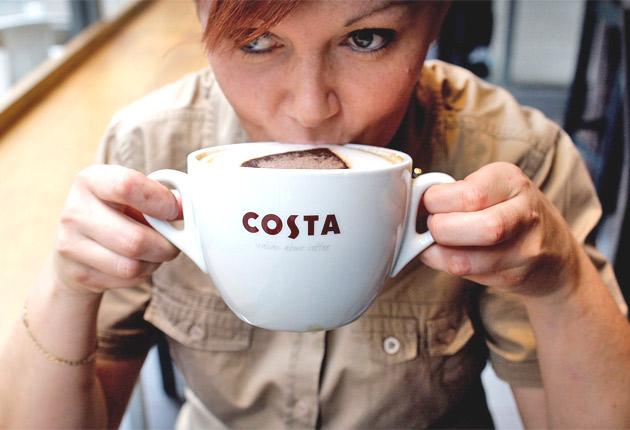Coffee cup charge would be step in the right direction, a ban would be better still
A study by Cardiff University has indicated a plastic bag style levy could cut the mountain of disposable cups ending up in landfill

Your support helps us to tell the story
From reproductive rights to climate change to Big Tech, The Independent is on the ground when the story is developing. Whether it's investigating the financials of Elon Musk's pro-Trump PAC or producing our latest documentary, 'The A Word', which shines a light on the American women fighting for reproductive rights, we know how important it is to parse out the facts from the messaging.
At such a critical moment in US history, we need reporters on the ground. Your donation allows us to keep sending journalists to speak to both sides of the story.
The Independent is trusted by Americans across the entire political spectrum. And unlike many other quality news outlets, we choose not to lock Americans out of our reporting and analysis with paywalls. We believe quality journalism should be available to everyone, paid for by those who can afford it.
Your support makes all the difference.Calling for a new tax isn’t going to make me terribly popular, but when it comes to disposable coffee cups, we need one. A study by Cardiff University, on behalf of coffee roaster Bewley’s, suggests it might just work.
Britons get through a mountain of disposable cups every day. As many as 2.5bn of them end up in landfill every year.
The problem is created by the plastic lining that keeps the cups waterproof. It makes them hard to recycle.
Coffee chains say they’re making efforts to improve “sustainability”, hard work they are fond of highlighting on their websites. The Whitbread-owned Costa says it will take your empties for recycling, including rivals’ cups. Costa and Starbucks will also give you a 25p discount if you use a re-usable cup.
Trouble is, most people take coffee away and then bin the cups at, say, their workplaces where recycling schemes aren’t geared up to get them to the specialist places that can handle them.
“We know you, our customers, are concerned. We are too. It’s a complex issue which requires the support of other coffee shops, manufacturers, waste companies, local authorities and customers,” says Costa.
Saying something is complex is too often code for “it would take too much effort”. In fact, the issue is a simple one. We caffeine addicts need to be a bit less lazy, and coffee chains need to shift their focus from PR action to real action.
While the discount they offer people who opt for reusable cups looks like the latter, according to the study it has little impact on consumer behaviour. Imposing an extra charge, by contrast, works better.
This shouldn’t come as any surprise. Remember the fuss that was created about the plastic bag charge? Supermarkets hated the idea, and shoppers were up in arms, despite the fact that it had for years operated successfully in Ireland.
Now, we’re used to it. You want a bag, you’ll pay a small amount extra. It should really be more than the current 10p, but that has nonetheless cut use by 85 per cent.
That’s a lot of waste not going into landfill, and a lot of plastic not getting into the environment. And into us, via the food chain. This isn’t something that should just concern tree hugging greenies like me. It should concern anyone with an interest in their health. A gut full of plastic isn’t good for that.
To be fair, the study found that a coffee cup charge didn’t have that same impact as the bag charge when it was trialled. However, when combined with other measures, including environmental messaging in cafes, the distribution of free reusable cups, and making them more easily available, the numbers were encouraging.
Personally, I’ve a lot of sympathy with Friends of the Earth, which says that we need to shift to more eco friendly containers, and that this should be made compulsory.
But, in the absence of that, a charge would be a step in the right direction, sitting well with the established principle that the polluter pays.
Ministers aren’t terribly keen on the idea, not least because the coffee chains, and their lobbyists, insist that they’re doing things.
Of course, central Government doesn’t have to deal with waste disposal. That’s on local Government. It has been left scrambling to find solutions, such as the City of London’s “Square Mile Challenge” which aims to recover half a million cups in the City. “We want to give coffee cups one more shot!” it declares and more power to people who came up with the idea.
But, really, it’s caffeine addicts like me that need to get shot of our addiction to disposable cups. If we did that, it would render such schemes unnecessary.
Subscribe to Independent Premium to bookmark this article
Want to bookmark your favourite articles and stories to read or reference later? Start your Independent Premium subscription today.
Join our commenting forum
Join thought-provoking conversations, follow other Independent readers and see their replies
Comments